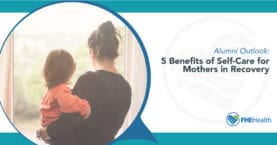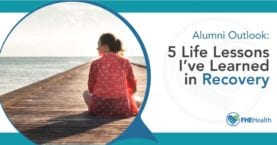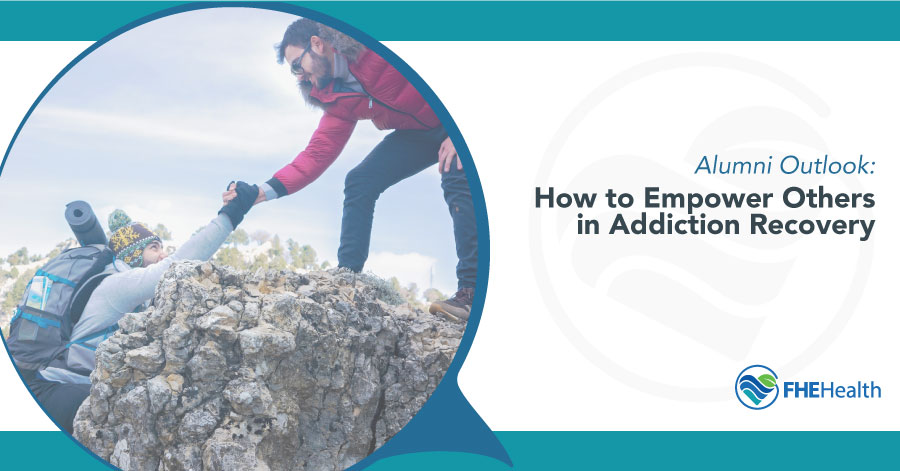
Before getting sober, I vividly remember wondering how other people were so happy living “boring,” sober lives. I couldn’t fathom spending one second sober. In fact, I often made fun of the friends who gracefully declined to party with the rest of us. The sober individuals in my life never pressured me to evaluate my life, nor did they ever push their lifestyle choices onto me. It was quite the contrary; I could see their undeniable lust for life that I just couldn’t seem to grasp. After years of painful exploration, I found myself on a plane heading to South Florida, seeking the same wholesome lifestyle I avoided my whole life.
Upon entering treatment at FHE Health, I was compliant but internally rebellious against the idea of adopting any new ideas. The best way to explain my resistance – ignorance. I spent my entire life reveling in chaos. I longed for peace, but I also sabotaged any chance to experience serenity. There came the point in my recovery where I had to take an honest look at why I destroyed the positive and healthy things in my life. I began reflecting on the most influential women in my life, and it was in that moment I discovered that each one of those women displayed characteristics of the kind of woman I aspired to be. These women never once pressured me to pick up my cross and follow them, but rather they loved me right where I was and stayed true to who they were.
There is something extremely attractive about an individual who does not waver their moral compass in conjunction with the company that surrounds them. The love, transparency, and vulnerability these women shared with me was paramount in establishing a foundation for the woman I wanted to be. These women empowered me. Today, I have almost four years sober, and I try to live a life that is a natural byproduct of the hard work and grace that has been thrown into my recovery. My sole purpose in life is to spread the message of hope that is found in recovery, and the best way to do that is to live a life that displays the promises found in sobriety.
So how do you empower someone who may be struggling with drugs and alcohol and considering recovery? How do you skip over the preachy lectures and actually have a positive impact on the people around you? Here are a few things to keep in mind if you want to empower others in recovery.
You’re only as good as your word.
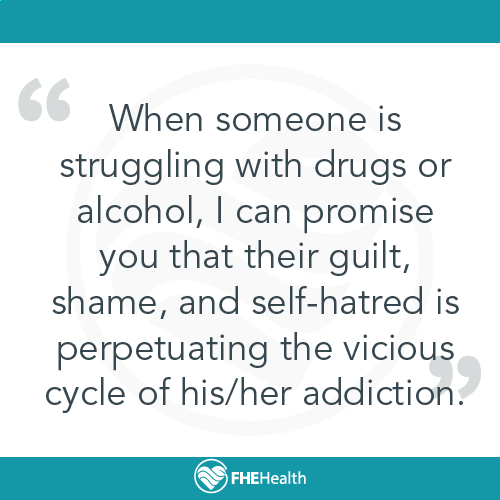 One of the most important aspects of inspiring and empowering others is to lead by example. Many newcomers enter the recovery realm seeking an out – looking for a way to prove this whole sobriety thing is too good to be true. More specifically, we often find our way into recovery, looking to prove that all of the sober people are full of it.
One of the most important aspects of inspiring and empowering others is to lead by example. Many newcomers enter the recovery realm seeking an out – looking for a way to prove this whole sobriety thing is too good to be true. More specifically, we often find our way into recovery, looking to prove that all of the sober people are full of it.
I can specifically remember my very first AA meeting. I walked in, and I was instantly convinced all of the people in that room were drinking the Kool-Aid. I was not convinced that these people weren’t smoking, popping, or drinking something. I didn’t trust anyone, mostly because I couldn’t trust myself. I knew what kind of a person I was, and I assumed you were just as dishonest and manipulative as me. It took some time before I began to realize that the people in recovery walked the walk. In other words, these people didn’t want anything from me other than to see me succeed. There was no catch, and their actions followed their words. The relationships I began to form with women in the rooms of AA restored my faith in “good people,” and most importantly, restored my faith in my ability to recover.
Radical acceptance is always the answer.
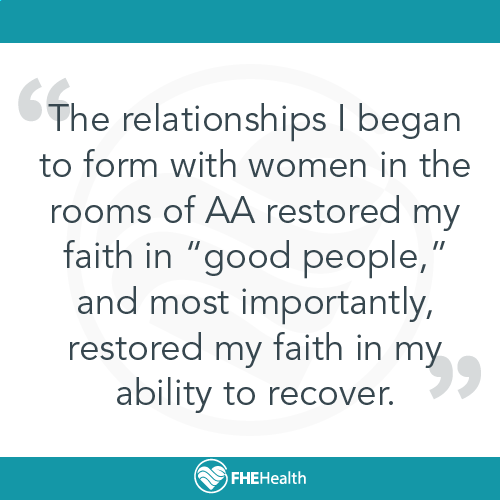 You’ve probably heard it many times in recovery: “Acceptance is the answer to all of my problems.” This doesn’t only apply to the newcomer, but the helpful, recovering alcoholic or addict as well. When someone is struggling with drugs or alcohol, I can promise you that their guilt, shame, and self-hatred is perpetuating the vicious cycle of his/her addiction. Often, an addict will feel ashamed and absolutely unworthy. This victim mentality is a key component of why your loved one may continue using drugs and/or alcohol to cope.
You’ve probably heard it many times in recovery: “Acceptance is the answer to all of my problems.” This doesn’t only apply to the newcomer, but the helpful, recovering alcoholic or addict as well. When someone is struggling with drugs or alcohol, I can promise you that their guilt, shame, and self-hatred is perpetuating the vicious cycle of his/her addiction. Often, an addict will feel ashamed and absolutely unworthy. This victim mentality is a key component of why your loved one may continue using drugs and/or alcohol to cope.
Practicing radical acceptance of the individual and practicing unconditional love cultivates a foundation for recovery.
When I first got sober, I realized I sabotaged many things in my life because I simply felt like I was undeserving. The few people that believed in me and loved me right where I was served a major role in my recovery. I already believed I was less than, in every facet of my life. This mentality justified my addiction and placed me in the perfect position to be a victim. Once I started to involve myself within AA, I began to see that we were all the same. We were all enslaved to our disease, made horrible decisions, and after enough pain, we all landed in the rooms of recovery. I was welcomed with not only open arms but with acceptance, I had never experienced before. Once I spilled my guts to my sponsor and she heard all of the horrible things I had done, I was sure she would never acknowledge my presence again. However, it was quite the contrary. My sponsor’s unwavering support, love, and acceptance planted the seed for me to find a grain of self-acceptance. Through our relationship, slowly but sure I began to rediscover, accept, and love myself right where I was. Ultimately, I began to feel empowered as life took on a whole new meaning.
Hold up the truth, in love.
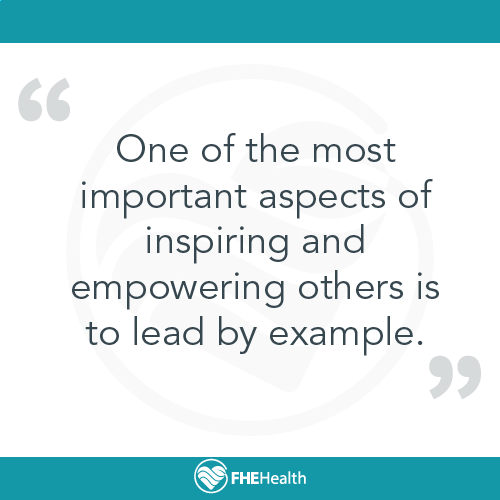 The most effective way to empower other addicts is to hold up and live by your truth. After all, transparency is critical. Addicts and alcoholics seeking a way out of their addiction often rebel against the first sign of anything that isn’t 100% authentic. Recovery can be painful, messy, and unpredictable. You are laying the groundwork for unrealistic expectations and unattainable perfectionism if you aren’t entirely transparent about your experiences. Many people will tiptoe around addicts in fear of “setting them off” or provoking them to relapse. The opposite is true.
The most effective way to empower other addicts is to hold up and live by your truth. After all, transparency is critical. Addicts and alcoholics seeking a way out of their addiction often rebel against the first sign of anything that isn’t 100% authentic. Recovery can be painful, messy, and unpredictable. You are laying the groundwork for unrealistic expectations and unattainable perfectionism if you aren’t entirely transparent about your experiences. Many people will tiptoe around addicts in fear of “setting them off” or provoking them to relapse. The opposite is true.
An addict will struggle to relate to the fairytale stories of how glorious sobriety is. I couldn’t relate to the promises of “living my best life” because the truth is – I was ignorant of what that looked like. Once I began to see the fruits of the painful process of self-awareness and evolution, I wanted more of it. I surrounded myself with women who not only supported me but those that fearlessly held up the truth for me. There is no better way to help empower an alcoholic or addict than to lead by example and continue to share the truth, in love, with them.

